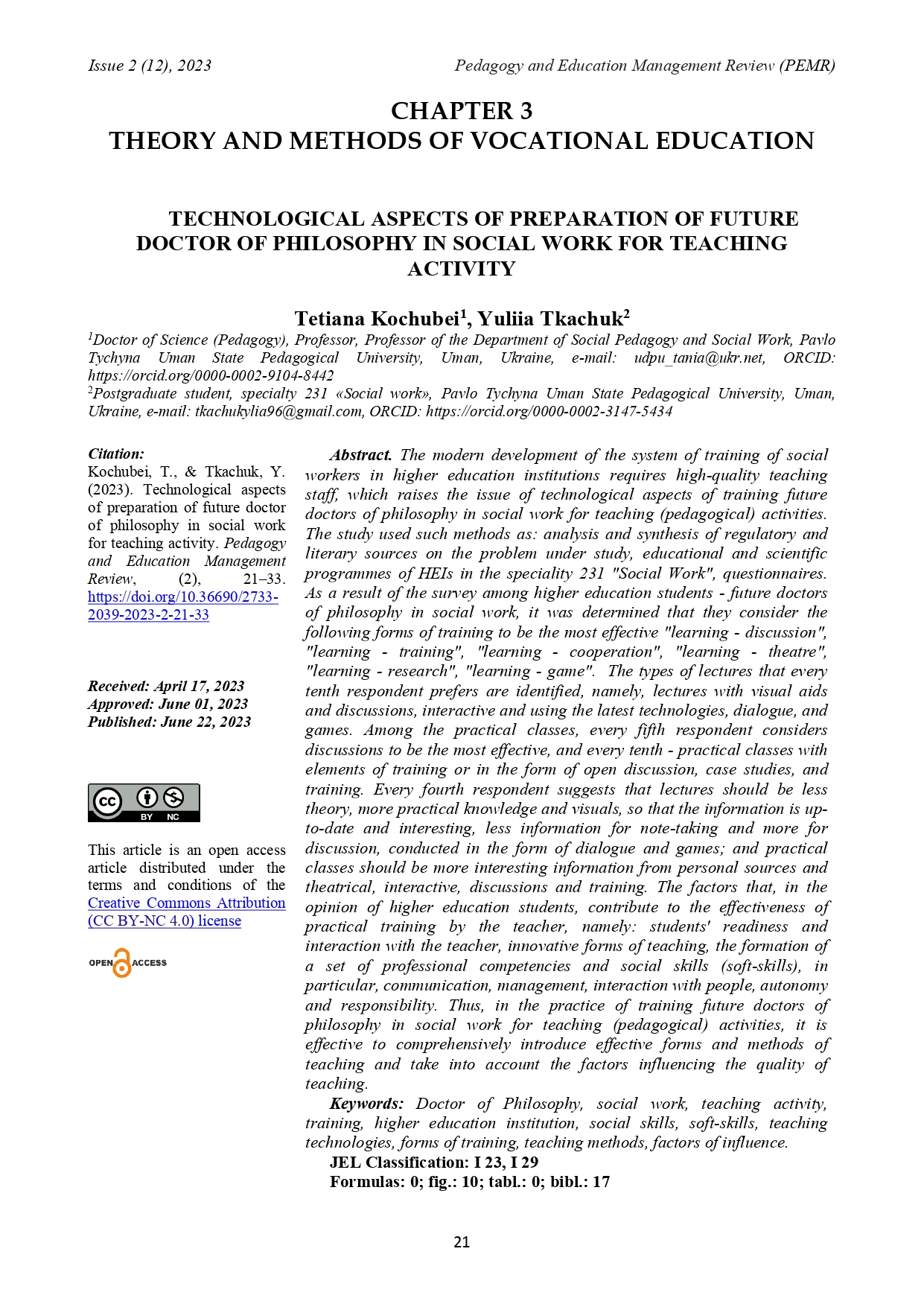TECHNOLOGICAL ASPECTS OF PREPARATION OF FUTURE DOCTOR OF PHILOSOPHY IN SOCIAL WORK FOR TEACHING ACTIVITY
DOI:
https://doi.org/10.36690/2733-2039-2023-2-21-33Keywords:
Doctor of Philosophy, social work, teaching activity, training, higher education institution, social skills, soft-skills, teaching technologies, forms of training, teaching methods, factors of influenceAbstract
The modern development of the system of training of social workers in higher education institutions requires high-quality teaching staff, which raises the issue of technological aspects of training future doctors of philosophy in social work for teaching (pedagogical) activities. The study used such methods as: analysis and synthesis of regulatory and literary sources on the problem under study, educational and scientific programmes of HEIs in the speciality 231 "Social Work", questionnaires. As a result of the survey among higher education students - future doctors of philosophy in social work, it was determined that they consider the following forms of training to be the most effective "learning - discussion", "learning - training", "learning - cooperation", "learning - theatre", "learning - research", "learning - game". The types of lectures that every tenth respondent prefers are identified, namely, lectures with visual aids and discussions, interactive and using the latest technologies, dialogue, and games. Among the practical classes, every fifth respondent considers discussions to be the most effective, and every tenth - practical classes with elements of training or in the form of open discussion, case studies, and training. Every fourth respondent suggests that lectures should be less theory, more practical knowledge and visuals, so that the information is up-to-date and interesting, less information for note-taking and more for discussion, conducted in the form of dialogue and games; and practical classes should be more interesting information from personal sources and theatrical, interactive, discussions and training. The factors that, in the opinion of higher education students, contribute to the effectiveness of practical training by the teacher, namely: students' readiness and interaction with the teacher, innovative forms of teaching, the formation of a set of professional competencies and social skills (soft-skills), in particular, communication, management, interaction with people, autonomy and responsibility. Thus, in the practice of training future doctors of philosophy in social work for teaching (pedagogical) activities, it is effective to comprehensively introduce effective forms and methods of teaching and take into account the factors influencing the quality of teaching.
Downloads
References
Ashytok, N. V. (2016). Kompetentnisnyi pidkhid do fakhovoi pidhotovky pratsivnykiv sotsialnoi sfery u vyshchii shkoli [A competence approach to the professional training of social workers at high school]. Molod i rynok, 4, 12–16. [in Ukrainian].
Boiko, O. (2019). Doktorska pidhotovka iz sotsialnoi roboty u Velykii Brytanii: Oriientatsiia na rynok pratsi. [Doctoral training in social work in Great Britain: Orientation to the labor market]. Visnyk APSVT, 1, 60–69. [in Ukrainian].
Butylina O. V., Radchenko N. R. (2020). Rozvytok soft skills yak chynnyk pidvyshchennia efektyvnosti diialnosti sotsialnykh pratsivnykiv. [Development of soft skills as a factor of improving the efficiency of social workers]. Socioprostir: mizhdystsyplinarnyi elektronnyi zbirnyk naukovykh prats z sotsiolohii ta sotsialnoi roboty», 9, 53−60. URL: https://doi.org/10.26565/2218-2470-2020-9-07 [in Ukrainian].
Vinnytskyi, M. (2019). Rozroblennia, vprovadzhennia ta zabezpechennia yakosti osvitnikh prohram z pidhotovky doktoriv filosofii. [Development, implementation and quality assurance of educational programs for training doctors of philosophy]. Erazmus+. URL: http://erasmusplus.org.ua [in Ukrainian].
Innovatsiini tekhnolohii v suchasnomu osvitnomu prostori: kolektyvna monohrafiia [Innovative technologies in the modern educational space: a collective monograph] / Za zah. redaktsiieiu H.L. Yefremovoi. Sumy: Vyd-vo SumDPU imeni A. S. Makarenka, 2020. 444 s. [in Ukrainian].
Karahodina, O. H., Pozhydaieva, O. V. (2017). Zaprovadzhennia prohram pidhotovky doktoriv filosofii z sotsialnoi roboty: analiz potochnoi sytuatsii. [Introduction of training programs for doctors of philosophy in social work: analysis of the current situation]. Visnyk APSVT, 1, 85–91. [in Ukrainian].
Koshechko, N. V. (2015). Innovatsiini osvitni tekhnolohii navchannia ta vykladannia u vyshchii shkoli. [Innovative educational technologies of learning and teaching in higher education]. Visnyk Kyivskoho natsionalnoho universytetu imeni Tarasa Shevchenka, 1(1), 35–38. [in Ukrainian].
Kochubei T. D. (2022). Sylabus navchalnoi dystsypliny «Metodyka vykladannia fakhovykh dystsyplin (Sotsialna robota)» [Syllabus of the academic discipline "Methodology of teaching professional disciplines (Social work)"]. URL: https://fspo.udpu.edu.ua/wp-content/uploads/2022/11/ОК-06-Методика-викладання-фахових-дисциплін-Соціальна-робота-2022.pdf [in Ukrainian].
Kochubei, T.D. & Koliada, N.M. (Uklad). (2022). Metodyka vykladannia fakhovykh dystsyplin (Sotsialna robota): navch. posibnyk. [Methodology of teaching professional disciplines (Social work): teaching. Manual]. Vyd. 2-he, dopov. Kyiv : Komprynt, 222 s. [in Ukrainian].
Kochubei Tetiana, Tkachuk Yuliia. (2021). Sotsialni navychky soft skills u systemi kompetentnostei maibutnikh sotsialnykh pratsivnykiv. [Social skills, soft skills in the competence system of future social workers]. Sotsialna osvita i sotsialna robota. Uman, 2 (7), 43–51. [in Ukrainian].
Metody navchannia za Babanskym. (2018). [Teaching methods according to Babanskyi]. URL: https://studfile.net/preview/7181580/page:5/ [in Ukrainian].
Radchenko, O. Ya. (2020). Innovatsiini tekhnolohii yak skladova osvitnoho seredovyshcha suchasnoho zakladu osvity. [Innovative technologies as a component of the educational environment of a modern educational institution ]. URL: http://dspace.tnpu.edu.ua/bitstream/123456789/17177/1/5_Radchenko.pdf [in Ukrainian].
Semyhina, T. (2018). Zapochatkuvannia pidhotovky doktoriv filosofii iz sotsialnoi roboty: dosvid Akademii pratsi, sotsialnykh vidnosyn i turyzmu. [Starting the training of doctors of philosophy in social work: the experience of the Academy of Labor, Social Relations and Tourism]. Aktualni problemy sotsialnoi pedahohiky ta sotsialnoi roboty: m-ly Vseukr. nauk.-prakt. konf. (Uman, 11-12 zhovtnia 2018 r.). Uman : VPTs «Vizavi», 146–148. [in Ukrainian].
Stebliuk, S. V. (2011). Innovatsiini tekhnolohii navchannia u vyshchii shkoli. [Innovative learning technologies in higher education]. Naukovyi visnyk Uzhhorodskoho natsionalnoho universytetu, 20, 141–142. URL: https://dspace.uzhnu.edu.ua/jspui/bitstream/lib/5695/1/ІННОВАЦІЙНІ%20ТЕХНОЛОГІЇ%20НАВЧАННЯ%20У%20ВИЩІЙ%20ШКОЛІ.pdf [in Ukrainian].
Pro osvitu. [About education]. № 2145-VIII. (2017). Verkhovna Rada Ukrainy: Zakonodavstvo Ukrainy. URL: https://zakon.rada.gov.ua/laws/show/2145-19 [in Ukrainian].
Robles, M. (2012). Executive perceptions of the top 10 soft skills needed in today’s workplace. Business Communication Quarterly, 75(4), 453–465. [in English].
Semigina, Т., Kabachenko, N., Boyko, O. (2017). Piloting a social work doctoral programme: Ukraine's vignette. European Journal of Social Work, Vol. 20 (2), 265–276. [in English].







